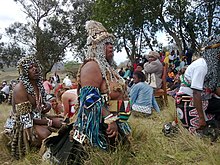Sangoma
Sangoma is a fortune teller and healer in southern Africa who is believed to be possessed by the spirit of an ancestor .
Female or male Sangoma play a central role in the medical care of the traditional Nguni cultures ( Zulu , Xhosa , Ndebele and Swazi ). Sangoma is someone who has undergone a strenuous training ( ukuthwasa ) lasting several months and was “called” by the ancestors in a subsequent, often several-day ceremony ( intwaso ). Through this ceremony, the ancestors took possession of the Sangoma for life, who has now become a member of his Sangoma school. Inyangas are another group of healers who work with medicinal herbs . A third group are spiritual healers who act against the background of syncretistic- Christian ideas and are called Amaprofeti (from "Prophet").
A survey published in 2000 by the Institute of Natural Resources in Pietermaritzburg found that 84 percent of the South African population consult a sangoma at least three times a year. The sangoma ritual includes a dance ( ngoma ) accompanied by drums and singing . It treats physical complaints such as headaches and high blood pressure, as well as psychological problems.
The mostly male Inyangas sell herbal medicine, muti , at markets and administer them to treat their illnesses. Since Inyangas traditionally do not practice divination or make a diagnosis, they rely on the cooperation of the mostly female sangomas when administering Muti.
Similar obsession rituals are Vimbuza in Malawi, Mashawe in Zambia and Pepo on the East African coast.
literature
- Wim van Binsbergen: Becoming a Sangoma: Religious Anthropological Fieldwork in Francistown, Botswana. In: Journal of Religion in Africa, Vol. 21, 1991, pp. 309-344
- Robert Thornton: The Transmission of Knowledge in South African Traditional Healing. In: Africa: Journal of the International African Institute, Vol. 79, No. 1 (Knowledge in Practice: Expertise and the Transmission of Knowledge) 2009, pp. 17–34
- Kevin Washington (Mwata Kairi): Zulu Traditional Healing, Afrikan Worldview and the Practice of Ubuntu: Deep Thought for Afrikan / Black Psychology. In: The Journal of Pan African Studies. Vol. 3, No. 8, June 2010, pp. 24-39
Web links
Individual evidence
- ^ Robert Thornton, 2009, p. 20
- ↑ Dirk Kohnert: Local Manifestations of Transnational Troubles: Different Strategies of Curbing Witchcraft Violence in Times of Transition in South Africa. In: Jürgen Oßenbrügge, Mechthild Reh (Ed.): Social Spaces of African Societies. Applications and Critique of Concepts about “Transnational Social Spaces”. (Afrikanische Studien / African Studies, Vol. 27) Lit, Berlin 2004, p. 175, footnote 2
- ^ Enid Gort: Swazi Traditional Healers, Role Transformation, and Gender. In: Gwendolyn Mikell (Ed.): African Feminism. The Politics of Survival in Sub-Saharan Africa. University of Pennsylvania Press, 1997, pp. 298f
